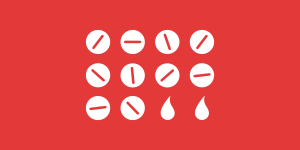Illustration by Emma Günther
Do you ovulate on hormonal birth control?
How birth control might impact your ovulation symptoms

Top things to know about ovulation on hormonal birth control:
Ovulation occurs when hormones signal your ovary to develop and release an egg
Hormonal birth control stops ovulation by blocking hormonal changes
It’s safe not to ovulate every month, and hormonal birth control can even decrease your risk of ovarian cancer
The pill, patch, and vaginal ring work by blocking ovulation. Progestin-only birth control often works in other ways to prevent pregnancy
Tracking with Clue can help you notice patterns in how your birth control method affects your cycle
Understanding ovulation
Ovulation is the release of an egg from the ovaries into the abdomen, where it’s transported into the fallopian tube. This provides the chance for an egg to be fertilized, and for pregnancy to occur. Ovulation typically happens midway through the menstrual cycle in response to your body’s changing hormones (1).
How does ovulation work?
During a typical menstrual cycle, ovulation happens at the end of the follicular phase. Follicle-stimulating hormone (FSH) levels rise during the follicular phase, causing follicles in the ovary to grow.
Each follicle contains an immature egg. One follicle typically develops more than the others and becomes the dominant one, while the others die off. When the dominant follicle is ready, another hormone, luteinizing hormone (LH), surges. This causes the dominant follicle to rupture and release the mature egg into the fallopian tube (2).
During a 28-day cycle, ovulation typically happens around day 14, but this can vary each cycle. The right and left ovaries may take turns releasing eggs each month (1). A mature egg has up to 24 hours to be fertilized by sperm in the reproductive tract. After this time, it starts to break down. If an egg is fertilized, it travels to the uterus for implantation (3).
How do you know if you’re ovulating?
Some signs and symptoms of ovulation include:
Ovulation pain: Also called mittelschmerz, this cramping typically occurs on one side of the abdomen (2). More than 2 in 5 people feel ovulation pain (4), which may range from very mild to severe.
Changes in cervical mucus: Some people notice an increase of thin, slippery mucus known as spinnbarkeit (2).
Increase in basal body temperature: Most people will have a very slight increase in body temperature (0.5–1°F) during ovulation (5).
An increased libido (sex drive) (2).
Mid-cycle bleeding or spotting (2).
How does hormonal birth control stop ovulation?
Hormonal birth control methods use exogenous hormones (hormones from outside of your body) to affect your normal cycle. Different types of hormonal birth control impact ovulation in various ways. Combined hormonal contraceptives (CHCs), like the combination birth control pill, patch, and vaginal ring contain both estrogen and progestin (synthetic progesterone). These CHCs prevent pregnancy primarily by blocking ovulation (6).
During a typical menstrual cycle, your changing hormones signal your body to develop a dominant follicle, release an egg, and prepare the uterus for a fertilized egg to implant (2). CHCs provide your body with a steady dose of both estrogen and progestin. Without your usual hormone changes, your ovaries won’t develop a dominant follicle or release an egg (6). No egg means no fertilization and no pregnancy.
CHCs are safe for most healthy people to use. Combined birth control pills are associated with decreased risk for ovarian and uterine cancers (6). The longer you take the combined birth control pill, the more your risk decreases (7,8).
Why might you still have ovulation symptoms while on birth control pills?
Although birth control pills block ovulation, there may still be times during your cycle when you notice ovulation symptoms.
It is rare to ovulate on the combined birth control pill, but there are some situations where breakthrough ovulation may occur. It may be more likely if you use a lower-dose birth control pill or if you take a hormone-free (placebo) window that lasts longer than seven days. There are also some types of medications (like those used to treat seizures) that may cause CHCs to be less effective (12).
Some ovulation experiences are similar to symptoms of other conditions. Changes in discharge or bleeding pattern, and pelvic pain can be signs of infections like bacterial vaginosis (BV) or sexually transmitted infections (STIs) (13,14). Some side effects of hormonal birth control, like breakthrough bleeding, might also mimic ovulation signs (6). If these symptoms bother you or continue even when you’re taking your birth control correctly, it’s a good idea to check in with your healthcare provider.
What about other hormonal birth control methods?
Some types of birth control containing only progestin hormones affect ovulation in different ways. Let’s take a look at these below.
Do you ovulate on the mini-pill?
Sometimes. The progestin-only pill (POP, or mini-pill) prevents pregnancy by thickening cervical mucus, making it harder for sperm to reach and fertilize an egg, and thinning the lining of the uterus to make implantation more difficult. The mini-pill sometimes blocks ovulation, but not always. Around 4 in 10 people continue to ovulate while taking POPs (15).
There is a newer brand of progestin-only pill that contains the progestin hormone drospirenone. This may block ovulation more often than the traditional minipill containing norethindrone (16).
Do you ovulate on the birth control shot (Depo Provera)?
No. The birth control shot works by blocking the ovaries from developing and releasing an egg. It also thickens cervical mucus making it harder for sperm to reach an egg for fertilization (15).
Do you ovulate on the birth control implant (Nexplanon)?
No. The birth control implant works mainly by blocking ovulation. It also works by thickening cervical mucus and thinning the lining of the uterus, making implantation more difficult (17).
Do you ovulate on the hormonal IUD?
Sometimes. The hormonal IUD works by changing the lining of the uterus and thickening cervical mucus (18). Research has shown that people with the Mirena IUD ovulate around half of the time after one year of use (19). The odds of ovulating with the Mirena IUD increase over time, happening in 3 out of 4 menstrual cycles after four years (19). Most people with Skyla and Kyleena IUDs continue to ovulate (20,21).
The importance of tracking your birth control and ovulation symptoms
Tracking your birth control with Clue can help you create a routine and stick to a regular schedule. Tracking may help you remember when it’s time to take your pill or change your patch or vaginal ring. It may also help you notice how your body is impacted by changing hormone levels.
FAQs
Can birth control pills cause you to ovulate twice in one cycle?
No. Combined birth control pills work by blocking ovulation (6).
If birth control stops ovulation, then how do you get your period?
The bleeding that you experience on birth control is not technically a “period”. Combined hormonal contraceptives (CHCs) give your body a steady dose of estrogen and progestin every day (6), which means you aren’t having your typical hormone fluctuations. When you take the placebo pills at the end of your pill pack, your body experiences hormone withdrawal. The sudden decrease tells the uterus it’s time to shed its lining. This is called withdrawal bleeding (22).
Does the morning-after pill stop ovulation?
Yes, emergency contraceptive (EC) pills (or morning-after pills) work by blocking or delaying ovulation in the cycle when they are used (23,24). There are two types of EC pills: levonorgestrel EC and ulipristal acetate EC. Ulipristal acetate is only available by prescription in the US.
Where do your eggs go when you're on birth control?
You are born with all the eggs you’ll ever have in your ovaries, and they continuously break down from the time you are born until you go through menopause (1). Hormonal birth control that blocks ovulation stops ovarian follicles from developing and releasing mature eggs. It does not affect the number of follicles you have or impact future fertility (25).
When are you most likely to get pregnant on birth control?
Breakthrough ovulation on hormonal birth control is more likely to happen in people who use pills with a 21/7 day formulation (21 days of hormone pills and 7 days of inactive pills). Research has shown that you are more likely to ovulate if you take a hormone-free interval of more than seven days. This means if you take more than a week off your birth control at a time, you are more likely to become pregnant. You are also more likely to become pregnant on birth control when it is taken incorrectly (26).
